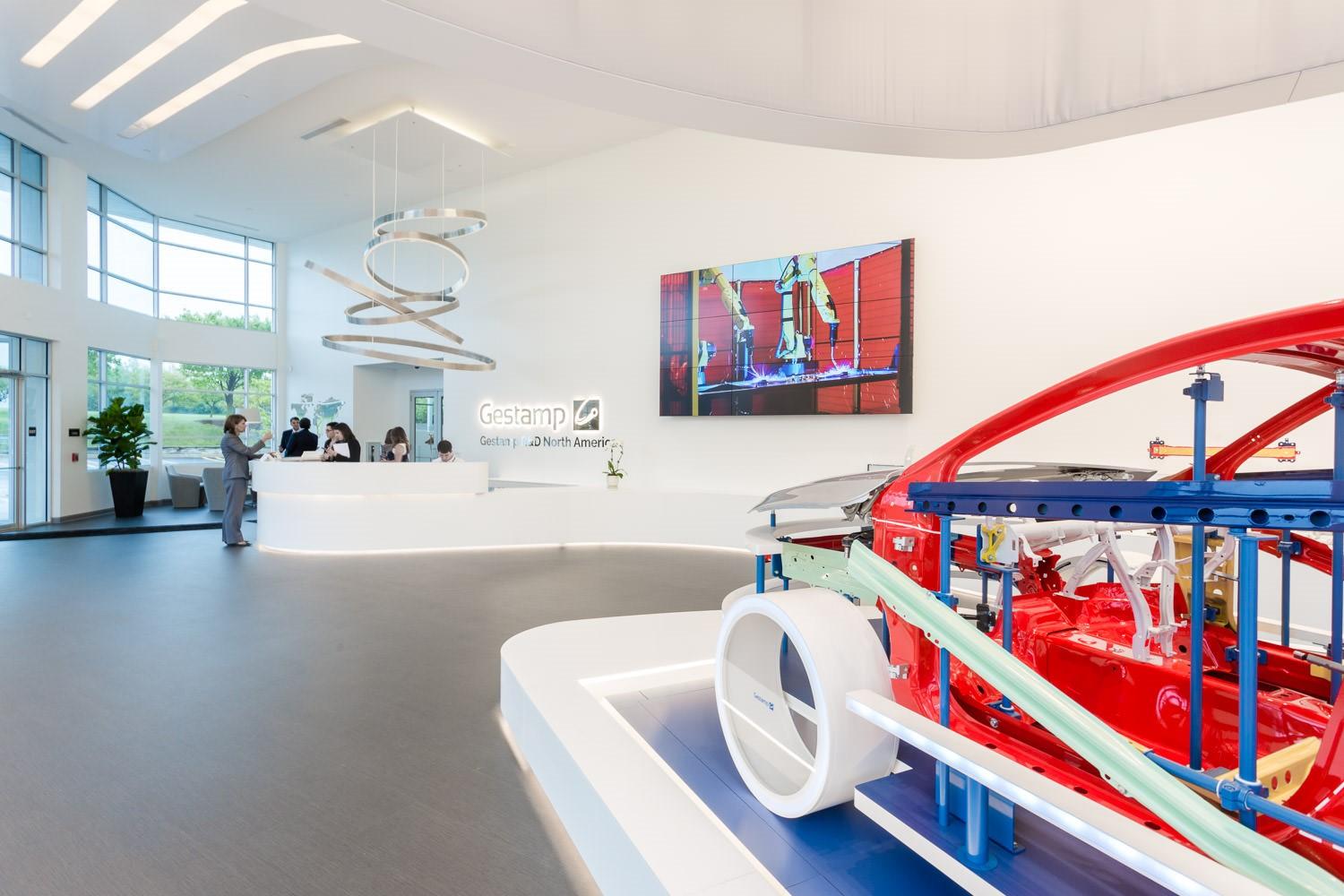Green fiber-reinforced composites instead of steel for chassis parts
Gestamp, Fraunhofer Institute for Chemical Technology ICT and its project partners are facing the scientific challenge to implement mass production of green fiber chassis parts. The broad Eco Dynamic SMC consortium brings together expertise from the aerospace, automotive and scientific industries.
Mobility demands are subject to constant change. Due to new emissions regulations and increasing electric mobility, lightweight construction and safety continue to be drivers for future automotive and mobility applications. The sustainable use of limited resources and the mandatory reduction of CO2-emissions during the production process and the lifetime of the vehicle are now the focus of development, in addition to the performance of the individual parts of a vehicle.
Gestamp is comitted to create a vehicle that is better for the environment and safer, to contribute to the mitigation of climate change. The focus is on the production of a lighter car, so that it emits less emission during its use. For this reason, Gestamp, Fraunhofer Institute for Chemical Technology ICT and several other consortium partners have collaborated to make the ECO Dynamic SMC project a tangible reality.
Thanks to its good material properties, recyclability and worldwide availability, steel is still often the material of choice in the automotive and mobility industry, and will certainly continue to be so in the future. However, the trend is also towards new materials that expand the range of materials and fulfill the motto "the right material in the right place". Fiber-reinforced composites offer excellent lightweight construction potential and safety features. The use of recyclable materials leads to a good balance between energy consumption, profitability and sustainability.
Fiber-reinforced materials are currently used in large numbers for body parts, but not for chassis components in the automotive or aerospace industry. The Eco Dynamic SMC project addresses this issue by developing a closed engineering loop for an automotive chassis control arm for a high volume production and a suspension part of a motor glider, substituting steel with fiber-reinforced material with the aim to implement the CF-SMC Technology for dynamic and safety relevant chassis components in high volume productions.
Initiated in October 2021 and funded by the German Ministry of Energy and Climate Protection, Eco Dynamic SMC (Grant Number: 03LB3023A) will address the scientific problem of developing a comprehensive continuous engineering process for fiber composite reinforced components that meet OEM approval procedures. The broad Eco Dynamic SMC consortium brings together expertise from the aerospace, automotive and scientific industries. Cooperation between universities, academic institutes and companies from various relevant sectors promotes the transfer of technology and experience across industry borders. Gestamp is the head of the consortium of Eco Dynamic SMC project.
Today, a continuous development process is established for metals and the procedure is defined based on available material data for manufacturing, product simulations and specific material parameters addressing e.g. formability, durability, stiffness, strain rate behavior or weldability.
Starting with the development of a digital shadow from the raw material manufacturing to be aware about the fiber content and weight of the material stack before the transfer into the tool. Substantial material characterization will be the groundwork for the integration of the material properties and fiber orientation from manufacturing process into the product development simulation. At the end of the development, a prototype will be manufactured and tested as component and on a test vehicle to evaluate the mechanical and acoustic behavior.
In the second project stream, a suspension part for a motor glider is developed by following the same strategy of the closed loop of process and product engineering.
In addition to the development cycle, the Eco Dynamic SMC project is dedicated to other core aspects such as a good CO2 balance, a recycling concept, optimized use of materials, reduced energy consumption and the careful use of resources.
Eco Dynamic SMC Consortium
The project consortium consists of: Fraunhofer Institute for Chemical Technology ICT, Karlsruher Institut für Technologie, DG Flugzeugbau GmbH, Koller Formenbau GmbH, Schmidt & Heinzmann GmbH & Co.KG, Toray Industries Europe GmbH, Vibracoustic SE, Gestamp Autotech Engineering Deutschland GmbH.
Associated Partners: BMW AG, Premium Aerotec GmbH
Gestamp
Gestamp is a multinational company specialized in the design, development and manufacture of highly engineered metal components for the main vehicle manufacturers. It develops products with an innovative design to produce lighter and safer vehicles, which offer lower energy consumption and a lower environmental impact. Its products cover the areas of bodywork, chassis and mechanisms.
The company is present in 24 countries with more than 100 production plants, 13 R&D centers and a workforce of nearly 40,000 employees worldwide. Its turnover in 2021 was 8,093 million euros. Gestamp is listed on the Spanish stock exchange under the ticker GEST.
Fraunhofer Institute for Chemical Technology ICT
The main campus houses more than 100 laboratories, pilot plants and test centers on a total area of 21 hectares. The research orientation enables us to combine research and development activities in this area with large demonstration plants. The focus is on the scalability of processes, on the transfer of research results from the laboratory to the pilot plant scale, and in some cases on pre-series application.
Customers and project partners are chemical and process engineering companies, automotive manufacturers and their suppliers, the plastics processing industry, material manufacturers, recycling companies, companies from the energy and environmental sectors, customers from the security industry, the construction industry and the aviation sector.
Fraunhofer ICT Fraunhofer Gestamp aerospace Automotive fiber-reinforced composites
Gestamp; Fraunhofer ICT



